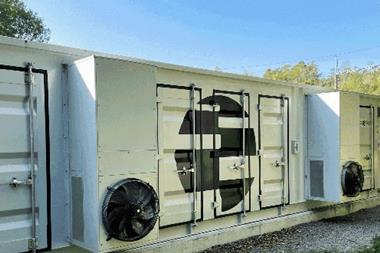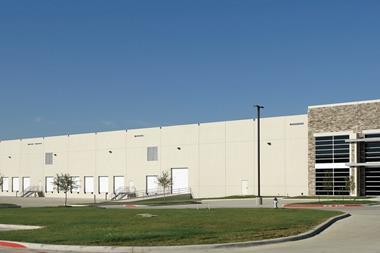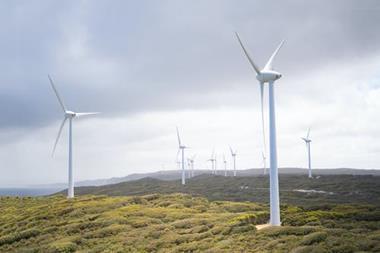Despite concerns that interest rates will be reduced more slowly than previously expected – or even raised – investors should focus less on the short-term news and look at the longer-term trends, Brookfield CEO Bruce Flatt told delegates at this year’s INREV Annual Conference 2024 in Berlin.
In a discussion with journalist and political commentator Caroline Daniel, Flatt emphasised that what was most important in the medium term was that interest rates had stabilised and this would be crucial for capital markets, including real estate and private equity.
While inflation was not falling as fast as some would like, Flatt said it would continue to decline regardless of the exact number of future rate cuts, adding that 50bps changes in interest rate changes would have a minimal impact on real estate decisions.
Focusing on such minor fluctuations was a “mistake”, he said, emphasising the importance of understanding the overall trend and recognising that the industry is likely to be past the peak of “interest-rate worries”.
More importantly, Flatt highlighted a positive shift in the capital markets over the past seven months and observed a return of cash and liquidity across various sectors, including real estate sponsors and private equity. This influx of capital, rather than small interest-rate movements, “drives the markets” today.
In his view, a key to success in real estate lies in identifying and acquiring properties that are currently burdened by excessive debt. Such a strategy allows investors to capitalise on the underlying value of the real estate while mitigating risk.
“The greatest opportunity in real estate always has been, always will be, finding great real estate that has been over-financed and can’t be supported by the owner,” he said, allowing the buyer to avoid taking on “all the fundamental risks”.
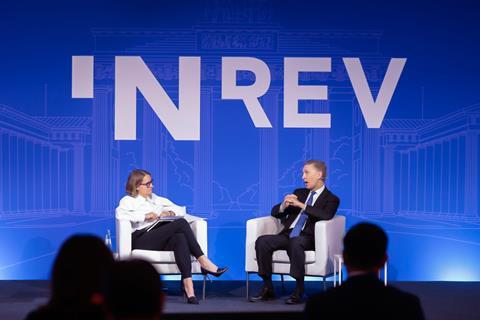
He said: “You can just strip off the capital structure and you have an amazing real estate investment”, adding that this is “where real real money is made”.
At the end of last year, Brookfield raised $30bn (€28bn) for its global infrastructure equity fund, making it the largest fund ever raised by Brookfield. Its latest global real estate fund, Brookfield Strategic Real Estate Partners, is targeting $15bn and has so far raised $8bn.
He said: “The fundraising environment has been tough for middle-market sponsors – tough in particular for people that rely on US institutions.” Brookfield has a strong franchise in the Middle East and Asia and so “we were able to raise a lot of money” last year, he said.
According to Flatt, the real estate investment landscape has undergone a significant transformation in the past year. “What’s changed in real estate now is that, 12 months ago nobody wanted to invest,” he said, but now the sentiment had shifted and potential investors were now actively enquiring about available deals and potential returns.
This shift indicates that “we’re past the bottom” in terms of investment activity, he said. In the US, there is a growing sense that entrepreneurs are re-entering the market and deploying capital, suggesting there could be a wealth of opportunities.
Referencing recent criticisms by International Energy Agency chief Fatih Birol of Europe’s reliance on Russian energy while turning its back on nuclear, Flatt was asked whether he expected a resurgence in nuclear power. Flatt said Brookfield was building – and potentially expanding – nuclear power plants in Poland, a country that needs clean baseload energy to maintain stability of its electrical grid.
Poland has chosen Brookfield’s technology and servicing, Flatt said, adding that while traditional nuclear plants face construction challenges, the overall sentiment towards nuclear power is much more positive – it’s carbon-free and provides critical baseload power, making it essential for achieving net-zero emissions.
Brookfield is also developing technology where smaller, modular nuclear reactors can be pre-fueled, shipped and then operated for eight years before needing refuelling. The technology would significantly simplify the process and could be operational within the next three to five years, Flatt said.
Large portfolios benefit from diversification’s risk mitigation
Brookfield manages a globally diversified real estate portfolio worth $276bn, a $102bn portfolio focused on renewable power and energy-transition assets, and an infrastructure portfolio valued at $191bn, which includes assets across transportation, data, utilities and the midstream sector.
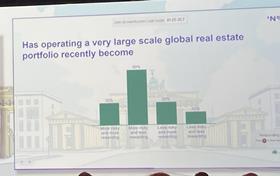
An audience poll at the event asked about the perceived risk and reward of managing a very large, global real estate portfolio. The options and responses were: more risky and more rewarding (20%); more risky and less rewarding (50%); less risky and more rewarding (20%); and less risky and less rewarding (11%).
Flatt challenged the assumption that large portfolios are inherently riskier. He argued that the significant scale of a global portfolio allows for immense diversification, which is a key advantage in business. He explained that having a global presence provides flexibility and avoids being forced into risky situations.
“Our global business has always given us an immense platform,” Flatt said.
Brookfield ranks second place in IPE Real Assets’s most recent Top 150 Real Estate Investment Managers and Top 100 Infrastructure Investment Managers surveys.
Flatt said scale gives Brookfield the ability to do things most investors cannot. Mistakes can be made along the way, but diversification protects the firm because a single misstep does not cripple the entire portfolio. If one is concentrated in one area, a mistake can be fatal, he said.
To read the latest IPE Real Assets magazine click here.











